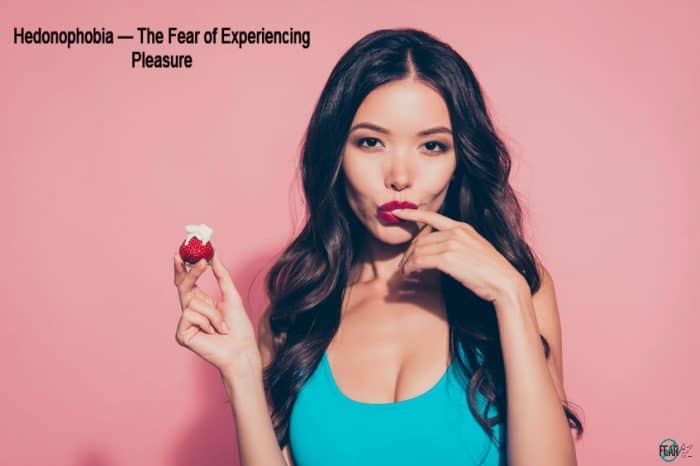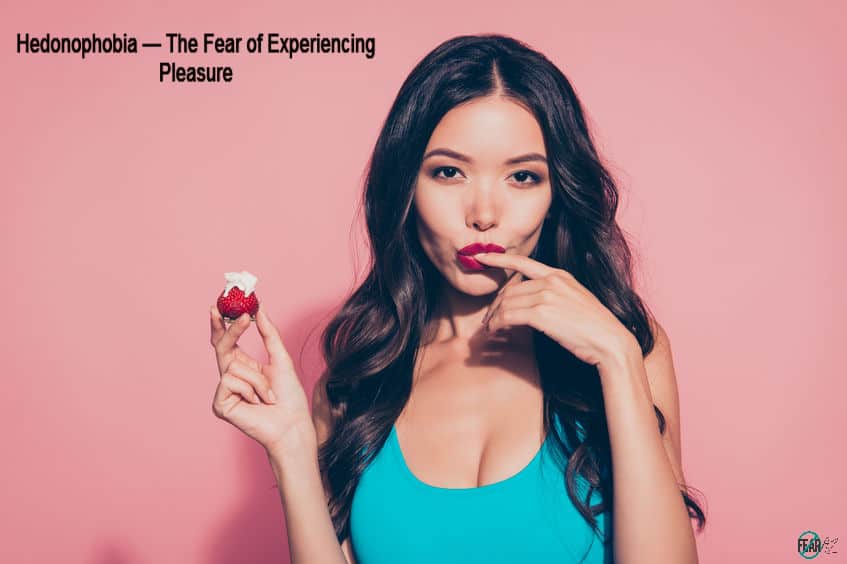Share This Article
Do you feel guilty about being happy?
It may sound unusual, but there are those who feel intolerant of happiness. They avoid the flow of good feelings out of fear of consequence.
Some may even worry that experiencing joy or excitement could possibly lead to pain.
They practice self punishment for feeling what humans strive to feel: pleasure.
If this sounds like you, then you may have a condition called hedonophobia, or an extreme and unusual fear of pleasure.
Hedonophobia appears in different ways for different people. Some who struggle with hedonophobia may worry strictly about themselves. Others may worry about themselves in comparison to the rest of the world.
If they receive a promotion or buy a new home, they can’t bring themselves to feel the excitement. Instead, they feel guilt for getting the good stuff when others are struggling. They might even have resigned to the thought that being happy when the rest of the world is in pain, is. . . well, selfish.
Do you feel you are doing something wrong by enjoying life? Do you fear happiness or panic at the thought of participating in activities that could bring you pleasure? If so, read on to learn about hedonophobia and what you can do to finally stop running from happiness.
What is Hedonophobia?
Hedonophobia is the extreme, illogical, and unpractical fear of experiencing pleasure. It is a behavioral dysfunction that robs the sufferer of even the simplest of good feelings.
This mental disorder might have come about as a result of childhood trauma, or a default disposition to unwarranted guilt and anxiety.
Growing up around people with unbridled hedonism could also lead to Hedonophobia in a child. In this case, the phobia sufferers take the opposite of extreme and abhorred pleasure.
People with Hedonophobia feel that no matter how happy they are, something or someone will come in and drag the rug from under their feet. As a result, they feel it would be best to avoid indulging in pleasure altogether.

In a world where the ‘pursuit of happiness’ is a popular ideal, having the opposite reaction to it can seem to be absurd. Hedonophobia sufferers are well aware of this. They know they are not acting normal and are missing out on a lot, and can even admit that they would rather not continue this way.
But like in other cases of phobia, people with Hedonophobia feel helpless in their malady. The mind holds power, and they are convinced that there is danger in feeling happiness, excitement, or pleasure. They also tend to develop a natural fight-or-flight reaction towards any of these things.
When severe, Hedonophobia can also have serious effects on a person’s quality of life.
Symptoms of Hedonophobia/the Fear of Experiencing Pleasure
Like other phobias, Hedonophobia manifests in several physiological and psychological symptoms. These symptoms include:
● Chronic constipation
● Depression
● Insomnia
● Anxiety
● Apprehensive anxiety
● Nausea
● Diarrhea
● Hypertension
● Mood swings
● Persistent melancholy
● Panic attacks
● Feeling numb
● Hyperventilating
● Pessimism
● Jittery
● Migraines
● Social isolation
● Lack of adrenaline
● Breathing problems
● Heart Disease
● Excessive sweating
● Guilt
Self-help for Hedonophobia/the Fear of Experiencing Pleasure
There are many reasons why you may be experiencing a fear of pleasure. The first step is to confront the problem from the source. Identify, if any, what experiences, traumas, or disappointments while growing up have led you to believe that pleasure of any form is harmful. This identification is the first step in your journey of healing, and if you can unravel the reason behind your anxiety and trauma, with the right help, you can find ways to stop it.
Another way you can help yourself manage your symptoms is through exercise which is a proven way to alleviate stress. You do not need to exercise rigorously, just light and consistent aerobic sessions can also do the trick. Exercising helps you release the body’s feel-good hormones which add a whole new level of positivity to your day.
Engaging in Yoga and other meditation activities can also help you take your mind off your triggers and focus on more relaxing thoughts and experiences. Yoga is an activity that requires the concentration of both your body and mind. It involves various poses that help stretch the body’s elasticity as well as controlled breathing practices for a better form and fewer stress episodes.
Incorporating meditation and relaxation into your self-help routine can do wonders for your growing chronic health symptoms, such as hypertension, migraines, and heart diseases all caused by phobia.
It increases your ability to be more mindful and present at the moment which is something you lose out on when you are prone to panic and anxiety. Visualizing yourself positively experiencing pleasure is another thing you can add to your meditation. This can help you cope better with your symptoms throughout your treatment and therapy.
This brings us to the most important aspect of your self-help journey, which is enlisting the help of a professional for treatments. The treatment for such phobias can come in different forms, ranging from short-term to long-term. But getting a professional involved and committing to the process is an essential step in overcoming your phobia.
Professional Help for Hedonophobia
Cognitive Behavioral Therapy
This is the most popular treatment used for such disorders. It involves reorienting the patient’s mind to question harmful and toxic thoughts about pleasure and replace them with more balanced, realistic, and practical views. People with Hedonophobia are taught to see that the reactions do not match the trigger at all. They are then equipped with the mental tools to correct their thinking and overcome extreme symptoms.
Dialectical Behavioral Therapy
This is a long-term strategy involving lessons such as half-smiling, mindfulness meditation, and coping ahead. It is a procedure used to equip patients with healthy coping mechanisms to properly manage their symptoms and navigate real-life triggering situations. DBT is usually used for patients with personality disorders but it has also proven to be effective in treating other forms of disorders and phobias, including Hedonophobia. It is a long-term procedure with even longer-term benefits for the patient.
Exposure Therapy
This is a therapeutic procedure that involves gradually and consciously exposing the patients to the source of the trigger. The goal is to help them get used to their object of fear until they are desensitized toward it. Exposure to the object of fear is first conducted in a controlled environment by the therapist until the patient becomes capable of confronting their fears in real-life situations.
Hypnotherapy
This involves a form of alternative medicine procedure known as hypnosis. The hypnotherapist places the patients in a subconscious state of mind using guided relaxation and intense concentration. While in this subconscious state, the hypnotherapist administers a procedure known as “posthypnotic suggestion”. It simply refers to the fact that since the brain is calm, it is more open to receiving suggestions or rather, can be ” tricked” into believing certain things.
In the case of a hedonophobia sufferer, the therapist may tell the patient how much they enjoy having fun, all the pleasurable activities one can enjoy without fear or harm. They may even convince the patient in their dream-like state of mind that their phobia is now a thing of the past and they can begin to enjoy or experience pleasure from now on.
With this, they gain a sense of confidence which allows them to face their triggers even when their minds come out of subconsciousness.
Conclusion
Everyone deserves to cherish their wins, experience fun, and embrace all the little pleasures of life. By now, you must be aware of how hedonophobia has robbed you of quality life, making you feel helpless in front of life’s simple pleasures. Inculcating the self-help tips above into your lifestyle, along with the professionally prescribed therapies, will help set you on a different, more fulfilling path.




